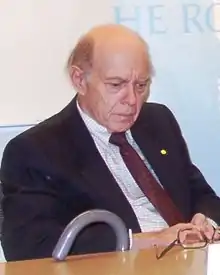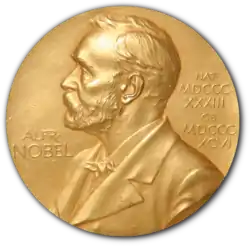Irwin Rose
Irwin Allan Rose (July 16, 1926 – June 2, 2015) was an American biologist. Along with Aaron Ciechanover and Avram Hershko, he was awarded the 2004 Nobel Prize in Chemistry for the discovery of ubiquitin-mediated protein degradation.[1][2][3][4][5][6][7]
Irwin Rose | |
|---|---|
 Irwin Rose, c. 2000 | |
| Born | Irwin Allan Rose July 16, 1926 Brooklyn, New York, U.S. |
| Died | June 2, 2015 (aged 88) Deerfield, Massachusetts, U.S. |
| Nationality | United States |
| Alma mater | University of Chicago (BS, PhD) NYU (postdoc) |
| Known for | Ubiquitin-mediated protein degradation |
| Spouse(s) | Zelda Budenstein |
| Children | 4 |
| Awards | Nobel Prize in Chemistry (2004) |
| Scientific career | |
| Fields | Biology |
| Institutions | |
Education and early life
Rose was born in Brooklyn, New York, into a secular Jewish family, the son of Ella (Greenwald) and Harry Royze, who owned a flooring store.[8] Rose attended Washington State University for one year prior to serving in the Navy during World War II. Upon returning from the war he received his Bachelor of Science degree in 1948 and his PhD in biochemistry in 1952, both from the University of Chicago.[9] He did his post-doctoral studies at NYU.[8]
Career and research
Rose served on the faculty of Yale School of Medicine's department of biochemistry from 1954 to 1963. He then joined the Fox Chase Cancer Center in 1963 and stayed there until he retired in 1995.[10] He joined University of Pennsylvania during the 1970s and served as a Professor of Physical Biochemistry.[11] He was a distinguished professor-in-residence in the Department of Physiology and Biophysics at the University of California, Irvine School of Medicine at the time his Nobel Prize was announced in 2004.[10]
Irwin (Ernie) trained several postdoctoral research fellows while at the Fox Chase Cancer Center in Philadelphia. These included Art Haas,[12] the first to see Ubiquitin chains, Keith Wilkinson,[1] the one to first identify APF-1 as Ubiquitin, and Cecile Pickart,[13] a world class enzymologist in many parts of the Ub system.
Personal life
Rose was married to Zelda Budenstein and had four children.[9] He died on June 2, 2015 at Deerfield, Massachusetts.[9][15] His wife died in 2016.
References
- Wilkinson, Keith; Hershko, Avram (2015). "Irwin Allan Rose (1926–2015) Established role of ubiquitin in the destruction of cellular proteins". Nature. 523 (7562): 532. doi:10.1038/523532a. ISSN 0028-0836. PMID 26223618.
- Rose, Irwin (2005), "Early work on the ubiquitin proteasome system, an interview with Irwin Rose. Interview by CDD", Cell Death Differ., 12 (9), pp. 1162–6, doi:10.1038/sj.cdd.4401700, PMID 16094392
- "Nobel Prize in Chemistry, 2004. Aaron Ciechanover, Avram Hershko and Irwin Rose", Indian J. Physiol. Pharmacol., 49 (1), p. 121, 2005, PMID 15881872
- Latonen, Leena; Laiho, Marikki (2004), "Nobel prize in chemistry goes to three persons with a key role in revealing the ubiquitin-mediated protein degradation pathway", Duodecim; Lääketieteellinen Aikakauskirja, 120 (24), pp. 2868–71, PMID 15700582
- Goldberg, Alfred L (2005), "Nobel committee tags ubiquitin for distinction", Neuron (published Feb 3, 2005), 45 (3), pp. 339–44, doi:10.1016/j.neuron.2005.01.019, PMID 15694320
- Neefjes, J; Groothuis, T A M; Dantuma, N P (2004), "The 2004 Nobel Prize in Chemistry for the discovery of ubiquitin-mediated protein degradation", Nederlands Tijdschrift voor Geneeskunde (published Dec 25, 2004), 148 (52), pp. 2579–82, PMID 15646859
- Hershko, A.; Ciechanover, A.; Rose, I.A. (1979), "Resolution of the ATP-dependent proteolytic system from reticulocytes: a component that interacts with ATP", Proc. Natl. Acad. Sci. USA, 76 (7): 3107–3110, Bibcode:1979PNAS...76.3107H, doi:10.1073/pnas.76.7.3107, PMC 383772, PMID 290989.
- Irwin Rose on Nobelprize.org
 including the Nobel Lecture on December 8, 2004 Ubiquitin at Fox Chase
including the Nobel Lecture on December 8, 2004 Ubiquitin at Fox Chase - Chang, Kenneth (2 June 2015). "Irwin A. Rose, Nobel-Winning Biochemist, Dies at 88". New York Times. Retrieved 4 June 2015.
- Weil, Martin (3 June 2015). "Irwin Rose, who shared 2004 Nobel Prize in chemistry, dies at 88". Washington Post. Retrieved 4 June 2015.
- "Selected Awards and Honors to Penn Faculty and Alumni: Nobel Prizes". University of Pennsylvania Website. Archived from the original on 3 November 2013. Retrieved 4 June 2015.
- Hershko, A.; Ciechanover, A.; Heller, H.; Haas, A.L.; Rose, I.A. (1980), "Proposed role of ATP in protein breakdown: conjugation of protein with multiple chains of the polypeptide of ATP-dependent proteolysis", Proc. Natl. Acad. Sci. USA, 77 (4): 1783–1786, Bibcode:1980PNAS...77.1783H, doi:10.1073/pnas.77.4.1783, PMC 348591, PMID 6990414.
- Vogel, Gretchen (2004), "Nobel Prizes. Gold medal from cellular trash", Science (published Oct 15, 2004), 306 (5695), pp. 400–1, doi:10.1126/science.306.5695.400b, PMID 15486272, S2CID 177309829
- Giles, Jim (2004), "Chemistry Nobel for trio who revealed molecular death-tag", Nature (published Oct 14, 2004), 431 (7010), p. 729, Bibcode:2004Natur.431..729G, doi:10.1038/431729a, PMID 15483574
- ABC News. "2004 Nobel Chemistry Winner Irwin Rose Dies at 88". ABC News.
External links
- Irwin Rose on Nobelprize.org
 including the Nobel Lecture on December 8, 2004 Ubiquitin at Fox Chase
including the Nobel Lecture on December 8, 2004 Ubiquitin at Fox Chase
| Wikimedia Commons has media related to Irwin Rose. |

